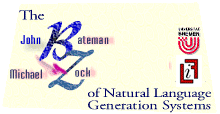
| System Name |
WYSIWYM
|
 |
| System Builders | Power,Evans
|
|
| Development Dates | 1998-ongoing | |
| Languages | English | |
| URL (if available) | http://www.itri.bton.ac.uk/projects/WYSIWYM/wysiwym.html | |
|
WYSIWYM aims to allow domain experts to encode their knowledge directly, by interacting with a feedback text, generated by the system, which presents the knowledge defined so far and the options for extending or revising it. Previous knowledge editors have provided a graphical interface so that users can interact with diagrams rather than writing code; WYSIWYM takes a step further, exploiting automatic text generation so that the user interacts with an ordinary natural language document rather than a relatively unfamiliar diagram. The acronym means `What You See Is What You Meant'. The feedback text presented to the user (What You See) reveals the knowledge that has been encoded during the interaction so far (What You Meant). Documentation of knowledge bases becomes automatic, since the system is designed to produce a description in natural language of any knowledge base in any state of completion. The only limitation is that the knowledge base must conform to an ontology which from the user's point of view is fixed. If this ontology proves insufficient, it must be extended by a programmer; the user cannot add new concepts because the system would lack the linguistic resources to express them. |
Roger Kibble, Richard Power, and Kees van Deemter.
Editing logically complex discourse meanings.
In Proceedings of the 3rd International Workshop on Computational Semantics, pages 147--162, ITK, Tilburg University, 1999.link
P. Piwek, Roger Evans, and Richard Power. R. Power, D. Scott, and R. Evans. Richard Power. Richard Power. R. Power and D. Scott. D.R. Scott, R. Power, and R Evans. Donia Scott. Kees van Deemter and Richard Power.
Information last updated: 18.09.2000 (dd.mm.yy)
Editing speech acts: a practical approach to human-machine dialogue.
In Preproceedings of Amstelogue'99: Workshop on the Semantics and Pragmatics of Dialogue, Amsterdam, 7-9 May 1999. University of Amsterdam.
What you see is what you meant: direct knowledge editing with natural language feedback.
In H. Prade, editor, 13th European Conference on Artificial Intelligence (ECAI'98), pages 677--681. John Wiley and Sons, Chichester, England, 1998.link
Generating referring expressions with a unification grammar.
In Proceedings of the 9th Conference of the European Chapter of the Association for Computational Linguistics (EACL'99), Bergen, Norway, 1999. Association for Computational Linguistics.link
Controlling logical scope in text generation.
In P. Saint-Dizier, editor, Proceedings of the 7th. European Workshop on Natural Language Generation (EWNLG'99), pages 1--9, Toulouse, May 1999.link

Multilingual authoring using feedback texts.
In Proceedings of the 17th International Conference on Computational Linguistics and 36th Annual Meeting of the Association for Computational Linguistics, pages 1053--1059, Montreal, Canada, 1998.
Generation as a Solution to its own Problem.
In Proceedings of the Ninth International Workshop on Natural Language Generation, pages 256--265, Niagara-on-the-Lake, Ontario, 1998.link
The Multilingual Generation Game: authoring fluent texts in unfamiliar languages.
In Proceedings of the 16th International Joint Conference on Artificial Intelligence (IJCAI'99), pages 1407--1411, Stockholm, Sweden, 1999. International Joint Conferences on Artificial Intelligence.
Coreference in knowledge editing.
In Proceedings of the COLING-ACL '98 Workshop on the Computational Treatment of Nominals, pages 56--60, Montreal, Canada, 1998.link
Page last generated: 25-1-2009 21:01:39